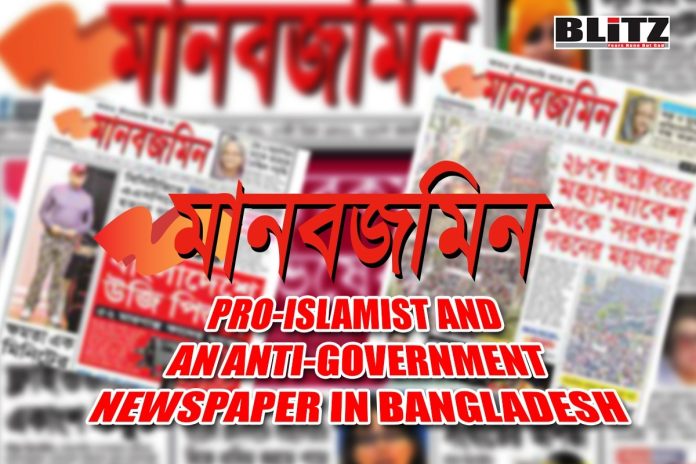The media, as the guardian of democracy, wields the influence to mold public perspectives, deliver impartial information, and uphold accountability. Recent controversies encircling Daily Manab Zamin, a Bangla tabloid, have sparked debates on media ethics. Allegations against the publication span bias, political favoritism, and the spread of misinformation aimed at collaborating with Bangladesh Nationalist Party (BNP) to unseat Prime Minister Sheikh Hasina and steer the nation toward a neo-Taliban state.
At the heart of this storm stands Matiur Rahman Chowdhury, the Chief Editor and co-owner of the newspaper. Claims suggest that familial connections to a prominent adviser to Prime Minister Sheikh Hasina have enabled Manab Zamin to reap various benefits from the Awami League government over the last 15 years. Simultaneously, Mr. Chowdhury’s close ties with anti-Awami League figures like Mushfiqul Fazal Ansarey raise eyebrows, given Ansarey’s consistent promotion by Manab Zamin. Ansarey, a full-time employee of the Bangladesh Nationalist Party, actively pushes agendas targeting Prime Minister Sheikh Hasina and her opponents, finding support in this publication. Manab Zamin isn’t just aligned against the Awami League but is accused of endorsing anti-Semitism, jihadism, and, in some instances, enemies of Bangladesh.
Over recent years, Manab Zamin has published numerous reports and translated content directly opposing Prime Minister Sheikh Hasina and her party, Awami League. Despite Ansarey’s persistent anti-Hasina activities, the publication retains him as its US correspondent. The publication’s claim of “neutral journalism” seemingly veils its service to the Bangladesh Nationalist Party and Jamaat-e-Islami, focusing on highly critical content against the Awami League while avoiding anything contradictory to radical Islam, jihadism, or the political rivals of Awami League. It appears that the entire team at Manab Zamin is tasked with unearthing anti-Awami League and anti-Bangladesh material online, translating and spreading it with a nefarious agenda.
Manab Zamin also acts as the propaganda mouthpiece of controversial Nobel Laureate Muhammad Yunus. It may be mentioned here that, Yunus is a friend of Hillary Clinton while he also is one of the top donors of Clinton Foundation. In addition to promoting Yunus, Manab Zamin also enthusiastically promotes anti-Bangladesh and pro-Islamist elements such as Zulkarnain Saer Sami, David Bergman, Tasneem Khalil, Taj Hashmi, Ali Riaz and others.
During the 1/11 government, Manab Zamin played a leading role in vilifying Sheikh Hasina and democratic forces in Bangladesh while actively participating in General Moeen U Ahmed’s controversial ambitions and agendas. Accusations label Manab Zamin as a “backstabber” for betraying Bangladesh by associating and collaborating with the country’s adversaries.
The primary responsibility of media is to scrutinize power, challenge authority, and offer unbiased information. Allegations of backstabbing against Daily Manab Zamin prompt reflection on whether the publication fulfills its journalistic duty or succumbs to personal vendettas. Transparency in editorial choices is crucial to uphold public trust.
Daily Manab Zamin faces accusations of promoting individuals critical of Prime Minister Sheikh Hasina and the ruling Awami League, raising doubts about its objectivity. In a democratic society, media outlets should present diverse perspectives to foster informed debates. The alleged anti-government stance within the publication raises concerns about balanced reporting and its impact on national unity.
Allegations of supporting Bangladesh Nationalist Party figures further complicate matters. Media outlets are ideally neutral platforms for diverse voices, not aligned with specific political factions.
Perceived alignment with BNP figures raises questions about Daily Manab Zamin’s objectivity and its role in political polarization. A deeper examination of these alleged affiliations is crucial to understand the publication’s position in the political landscape.
The publication is accused of patronizing anti-government elements, both domestically and internationally. By providing a platform for what is described as “vile propaganda” against the government, Daily Manab Zamin is accused of contributing to a divisive narrative that undermines political stability. Mushfiqul Fazal Ansaery, Zulkarnain Saer Sami, David Bergman, Tasneem Khalil, and others associated with BNP and Jamaat-e-Islami are allegedly supported by the publication, intensifying perceptions of its anti-government and anti-Bangladesh stance.
A recent instance involving a fabricated report on Ready-Made Garment (RMG) workers in Bangladesh adds fuel to the controversy. Misinformation not only damages the publication’s credibility but also has far-reaching consequences for affected individuals and industries. Upholding journalistic integrity demands truth, accuracy, rigorous fact-checking, and responsible reporting.
Given Prime Minister Sheikh Hasina’s commitment in her election manifesto to combat ongoing anti-Bangladesh propaganda, scrutiny of Manab Zamin and its Chief Editor Matiur Rahman Chowdhury is imperative in this context.




